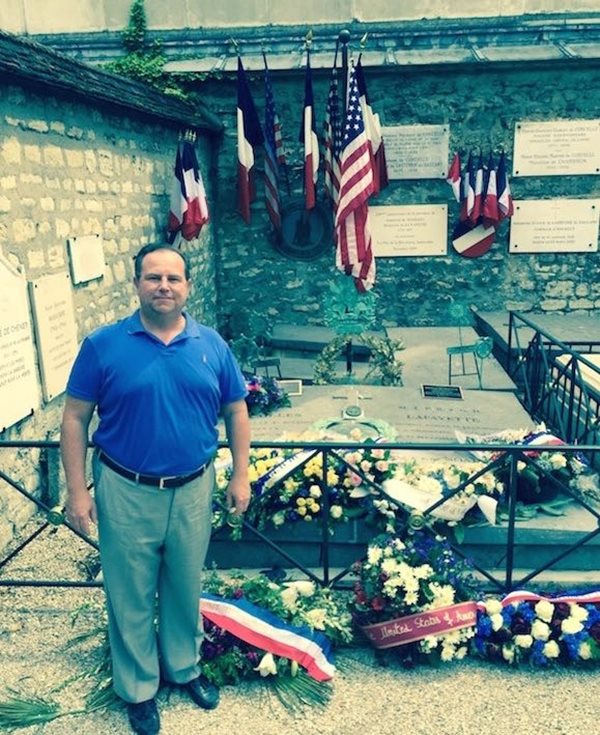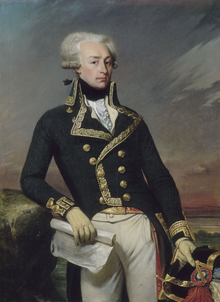.jpg.aspx)
Remembering General Lafayette, hero of the American Revolution. Newsmax CEO Christopher Ruddy lays flowers at the grave of the Marquis de Lafayette on July 4, 2015, Picpus Cemetery, Paris
.jpg.aspx)
Remembering General Lafayette, hero of the American Revolution. Newsmax CEO Christopher Ruddy lays flowers at the grave of the Marquis de Lafayette on July 4, 2015, Picpus Cemetery, Paris
Remembering Lafayette
FReep Mail me if you want on, or off, this Revolutionary War ping list.
The French joined in when they saw that we were winning. Before that Franklin was pleading with them to help.
If anyone can remember which French units served with us, I would appreciate them posting them.
There is a French base just outside of Dijon where I spent the night in a French army barracks, and the guys were showing me the paintings in their unit bar, of their history in America, but I couldn’t make out what they were saying in French, and I don’t remember which unit they were.
My great great great.... wsa the aid du camp of Layfette. Not the usual DAR. LOL
Lafayette also played a big role in the French revolution of 1830, when the last absolutist Bourbon king was driven off the throne and replaced by Louis-Philippe.
Lafayette kept it from getting too violent, and smoothed the way for the accession of Louis-Phillippe, the so-called “Citizen King.”
I believe Lafayette died in 1834, rather than 1830.

Pretty impressive
“Lafayette Street is a major north-south street in New York City’s Lower Manhattan. It originates at the intersection of Reade Street and Centre Street, one block north of Chambers Street. The one-way street then successively runs through Chinatown, Little Italy, NoLIta, and NoHo and finally, between East 9th and East 10th Streets, merges with Fourth Avenue. A buffered bike lane runs outside of the left traffic lane. North of Spring Street, Lafayette Street is northbound (uptown)-only; south of Spring Street, Lafayette is southbound (downtown)-only.
The street is named after the Marquis de la Fayette, a French hero of the American Revolutionary War.[1]”
https://en.wikipedia.org/wiki/Lafayette_Street

https://en.wikipedia.org/wiki/Visit_of_the_Marquis_de_Lafayette_to_the_United_States
http://rmc.library.cornell.edu/lafayette/exhibition/english/tour/
Lafayette. Words at the Tomb of Washington. [Mt. Vernon, October 17, 1824].
“The feelings, which on this awful moment oppress my heart don’t leave me the power of utterance. I can only thank you, my dear Custis for your precious gift and pray a silent homage to the tomb of the greatest and best of men, my paternal friend.”
Lafayette thanks George Washington's adopted son, George Washington Parke Custis (1781-1857), for giving him a sprig of Cyprus plucked from the tomb of George Washington. An 1829 account by Auguste Levasseur, Lafayette’s personal secretary, describes Lafayette’s 1824 visit to Washington’s grave: “the tomb is scarcely perceived amid the somber cypresses... Lafayette descended alone in the vault, and a few minutes thereafter reappeared, with his eyes overflowing with tears. He took his son and me by the hand, and led us into the tomb... We knelt reverentially near his coffin, which we respectfully saluted with our lips; rising, we mingled our tears with his”.
In my little town our home is right across the street from Lafayette Park.
I served on the USS Lafayette, so I took the time to find out what he did to get a missile sub named after him. I always remember Lafayette on July 4.
There is a statue of Lafayette on West Market St. in York, PA. York was the first Capitol of the United States when the Congress fled Philadelphia when endangered by the Redcoats. They came to York in order to have the Susquehanna River between them and the Brits.
The Articles of Confederation were signed in York. A cabal of politicians were planning to dump George Washington for some other pompous general when Lafayette arrived in York. Sensing the shenanigans that were afoot, he proposed a toast to His Eminence General Washington. Since we were desperate to have France as an ally, the cabal didn’t want to cross Lafayette, so they folded, joined in the toast, and the rest is history.
Shortly thereafter the Continental Army, defeated General Johnny Burgoyne up in New York State, taking many prisoners in the bargain, in substantial part thanks to the heroic efforts of Benedict Arnold. Upon that news reaching Europe, France signed on as our ally. Arnold later turned coat and betrayed his Country.
Lafayette truly was Washington’s surrogate son. During the bloody French Revolution Lafayette was erroneously accused of wrong doing and came close to being executed. His children were spirited out of France and brought to America. I cannot recall whether their mother was with them or not. The children lived at Mount Vernon until the unpleasantness in France cleared up. Released from prison, Lafayette came back to America to visit the Washingtons.
The account of the scene of his departure back to France is reported as very touching, with he and Washington embracing and weeping, both knowing that because of Washington’s advanced age they would never see each other again. The Founding of our Country has some wonderful human history among its pages.
Bookmark
"We left for Hamburg on September 19th, 1797. It was five years and one month since my father's arrest and twenty-three months since we joined him. The prisoners were accompanied by an Austrian major till they arrived at Hamburg, who usually drove in a carriage ahead. Our road, particularly at Dresden, Leipzig, Halle, and Hamburg, was one continual triumph. Throngs gathered to see my father and his companions. The prisoners, who at first could not bear [being] outdoors, grew stronger every day, but my mother's health prevented any real joy. The fatigue of the journey was too great in her state of exhaustion and illness; nevertheless, she made efforts to take part in the general joy and to respond to the numerous marks of respect shown to her."
So wrote one of Lafayette's daughters of the events which followed the release of the famous "Prisoners of Olmutz." Lafayette's incarceration as a political prisoner had become the cause célèbre of Europe and America, but the heavy hand of British Prime Minister William Pitt kept the hero of the American Revolution and his two companions incarcerated in Austrian dungeons for as long as could possibly be managed. British vengeance against Lafayette had begun to bear fruit in August of 1792, when the British-sponsored Jacobin faction in France succeeded in charging Lafayette with rebellion and treason, and put a price on his head, dead or alive. Lafayette and a group of his officers who supported the ideals of the American Revolution fled north toward Holland, hoping to sail to America.
But they were captured by the Austrians, and Lafayette was shifted from prison to prison, so that his friends and supporters would not know where to find him. When it was finally learned that he and two fellow officers were held at Olmutz, an unsuccessful rescue attempt was made. After that, Lafayette's conditions of imprisonment became even more stringent and unbearable. The two would-be rescuers, American medical student Francis Huger and German doctor Erich Bollmann, after themselves suffering eight months' captivity at Olmutz, sailed to America and briefed George Washington on the terrible conditions at the prison.
Lafayette's wife, Adrienne, who remained in Paris, was targetted by the Terror. She sent their son, George Washington Lafayette, to America to be protected by President George Washington, who sent the boy to live with Alexander Hamilton in New York. After retiring from the Presidency, Washington brought his namesake to live at Mount Vernon, and tried to help Adrienne by sending money to her via Holland, but it never reached her.
Adrienne managed to send her two daughters to safety with relatives before she was arrested and imprisoned by the Terror in November of 1793. Her mother, grandmother, and sister were sent to the guillotine, but even then, the name Lafayette gave her captors pause. The American Minister to France, the future President James Monroe, worked unceasingly to have her released. He and his wife Elizabeth, whom Paris had dubbed "La Belle Americaine," designed an operation to gain the good will of the fickle Parisians in Adrienne's favor. They had a coach painted with bright colors, and Elizabeth dressed in her most stylish clothes. She set out for Adrienne's prison, but took a long, slow route to attract attention. When she arrived, followed by a curious crowd, she asked for Adrienne to be brought out to see her, and when the two greeted each other, the onlookers applauded and wept at the sight.
Sentiment in Paris gradually turned in favor of Lafayette, and Adrienne was released in January 1795 after more than a year in prison. The Monroes took her into their home and nursed her back to health. Once recovered, Adrienne's goal was to reach Olmutz and share her husband's captivity in order to protect him against possible assassination. Accordingly, she and her two daughters boarded a ship, ostensibly for America, but the ship turned north according to plan and landed them in Hamburg.
No French citizen was allowed to enter Austria, because a state of war existed with France. But the American Consul in Hamburg, John Parish, issued a U.S. passport to Adrienne in the name of Madame Motier, a resident of Hartford, Conn. During the Revolution, Lafayette had been granted citizenship by a grateful City of Hartford, and Motier was one of his family names. Travelling under this passport, Adrienne and her daughters reached Vienna and remained incognito until Adrienne could obtain an audience with the Emperor Francis II. This was possible because Adrienne's family, the de Noailles, had served as French Ambassadors to the Austrian Court.
When she asked the Emperor if she could share her husband's captivity, he replied that she could, but "as to his liberty, that I can not give, my hands are tied." He was referring to pressure from the British Empire not to release such an ardent republican and international figure as Lafayette had become. On Sept. 29, Lafayette's family left Vienna for Olmutz.
http://schillerinstitute.org/educ/hist/eiw_this_week/v4n37_sep9_1797.html